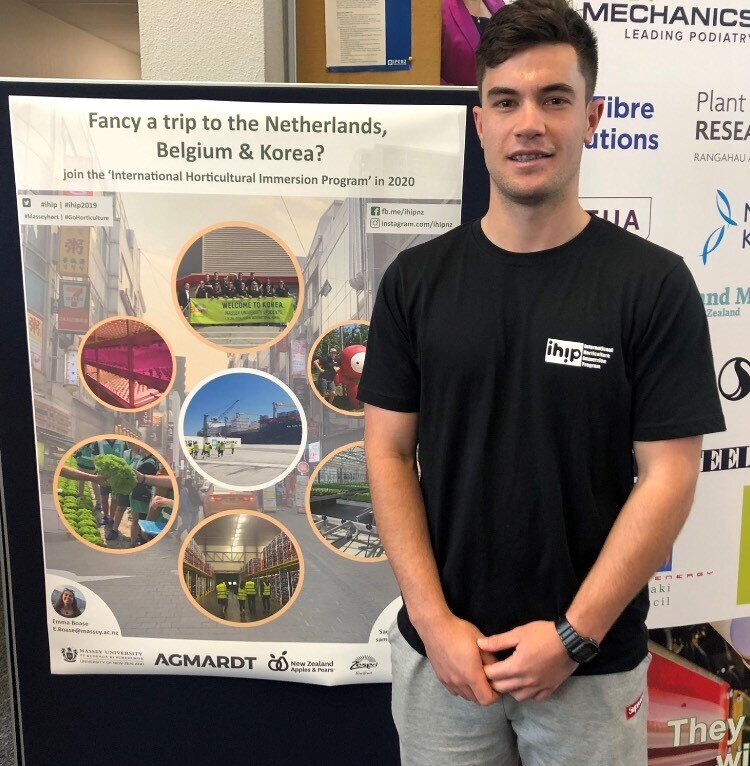IHIP Reflections Series: Collaborate, innovate and keep moving forward
Ma’ara Ave is a 3rd year Biology and Chemical Process Engineering student at Massey University as well as a wicket keeper-batsman for the Central Districts Stags. He is passionate about problem solving and creating viable solutions in the Primary Industries.
Time moves fast and if you don’t change with it you will be left behind sooner than you think. ‘Collaborate, innovate and keep moving forward’, This is the underlying message that resonated during my interactions with many leading horticultural companies and institutions across the Netherlands.
Challenged with a lack of space, the Netherlands somehow manages to be one of the highest exporting markets in the food industry worldwide. I believe this is due to their mindset of collaboration and willingness to trust in the future of technology for the production of food.
This was not better represented than by our visit to Agriport A7 where over 300 hectares of greenhouses are located in an area of conglomeration of large food companies operating high tech greenhouses. Not only do they share in a vision for the use of innovative technology for the growth of crops, but also in sustainable energy use. Local geothermal heat is used for the heating of the local greenhouses in a sustainable fashion.
Ma'ara promoting the International Horticulture Immersion Program at the 2019 Massey Open Day.
We visited Barendse-DC, who own 30 hectares of greenhouse in Agriport for the production of capsicums and tomatoes. Despite being small in comparison to other Agriport companies the sheer scale of their operation was mammoth. It wasn’t only the scale that was impressive, but the incorporation of technology in their production was second to none. Programmed picking trolleys moved produce between the greenhouses and fully automated pack houses like clock-work with no loose ends. It is this type of incorporation of technology into production systems that have led to a greater efficiency of food production in the Netherlands and a reason why they sit near the top of the tree.
In New Zealand we have a history of being apprehensive to introduce new technology into our production. However, if we maintain stuck in our ways and don’t realise the way the industry is heading, we may lose our relevance in the global market. We need to reach out and collaborate with other market players to future proof our own industry. There is a huge opportunity for growth and those companies that realise this the soonest are those that will stay above water.
Visits to companies such as PRIVA and Signify showed that viable tech solutions to the needs of the horticulture industry are in good hands. It was clear that these major players understood the needs of the farmer and their businesses were focused around providing a full service related to how their technology could help to produce high quality products at an increased yield.
PRIVA a data company that create software for controlled environments and processing systems now look at selling a service assured of increasing productivity and quality. They can do this by having an understanding of each specific plant and by using data feedback in collaboration with the grower can continuously improve the supplied environment to optimise growth.
Signify (Philips lighting) sell LED lights for plant production in green houses and modern (“vertical”) farms. However, instead of just selling a light product they sell light recipes. They do extensive research into the combinations of colours and spectrums that achieve the best growth for specific types of fruits and vegetables. It’s this acquired knowledge that they can sell to farmers to offer a well-rounded solution with an assured increase in production for farmers. Their product doesn’t just stop there. They also provide services for installation and the best operation practises through the use of engineers, plant specialists and account managers for each of their clients. This model provides an attractive way to incorporate technology into the field of horticulture.
The introduction of technology is definitely not a one size fits all model. As a nation we cannot just copy overseas examples, but we can learn from them. In New Zealand we are often scared to share and collaborate with competitors but if we don’t, we may struggle to move forward in the new world of food production. Our unique environment, culture and mindset towards horticulture production provides a challenge to our evolution. However, the question is not whether new technology is needed but instead how it should be incorporated and implemented to have the greatest impact? PRIVA a data company that create software for controlled environments and processing systems now look at selling a service assured of increasing productivity and quality. They can do this by having an understanding of each specific plant.
Ma’ara Ave
This blog post was written as part of the recent IHIP programme sponsored by FoodHQ.

